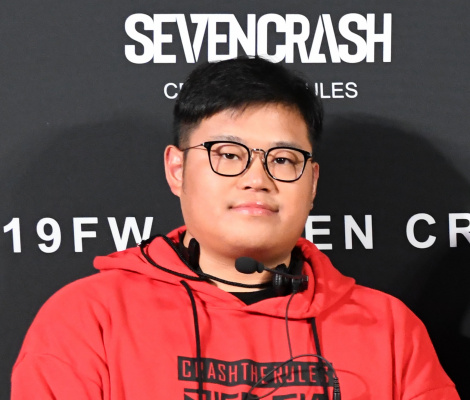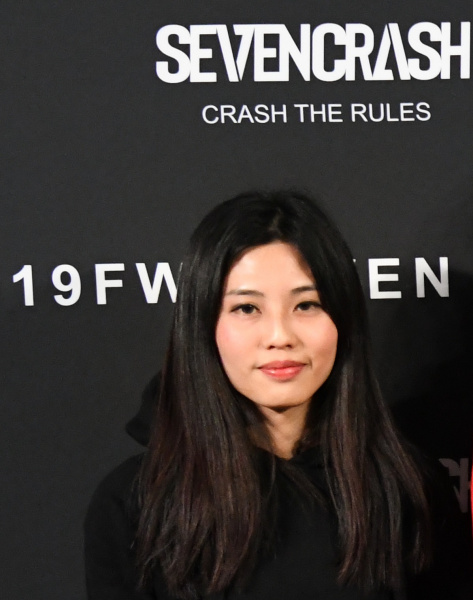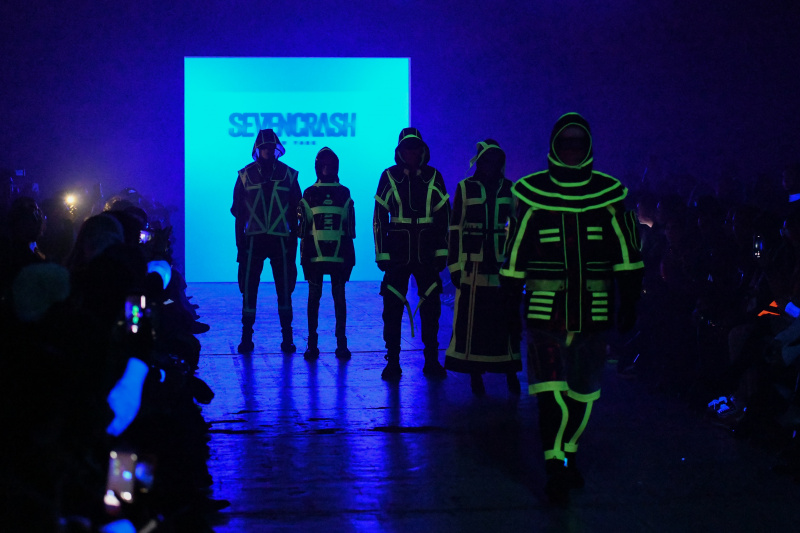When it comes to clothing, Taiwanese fashion designer Enchi Shen and her business partner Jason Yao like to break the rules. That’s why they decided to collaborate with chemical company BASF to showcase her third collection at New York Fashion Week in the winter of 2019 titled ‘Quantus’.
Shen’s latest collection was anything but typical. The survival-mode clothing seemed to be taken straight out of Aldous Huxley’s novel, or more recently out of the Netflix hit series “Black Mirror.” Glow-in-the dark 3D garments, oversized metallic windbreakers, boldly designed hoods, mesh pockets, goggles, parachute straps paired with galoshes, fencing masks, fanny packs and whistles on a string all forebode a not so distant dystopian future.
To achieve these futuristic streetwear looks, the designer turned to BASF, utilizing two of its eco-conscious materials—Freeflex, a TPU (thermoplastic polyurethane) fiber made out of Elastollan, which serves as a moisture-wicking material that’s easy to care for while it’s stretchable and comfortable, possessing low volatile organic compounds (VOCs); and Haptex—a sustainable PU (polyurethane) for synthetic leather, which complies with stringent VOC standards, as no organic solvents are used in the manufacturing process.
Shen is one of the founding members and Creative Director of Seven Crash, an urban fashion label that likes to emphasize the relationship between fabrics and technology. She studied fashion design and fashion management in Milan, Italy. As a former musician and stylist, fashion was a natural transition for the 29-year-old. The other founding member and Brand CEO of Seven Crash is Yao, a Chinese-American streetwear designer and entrepreneur who grew up in Queens, NY in the 90’s, heavily influenced by American hip-hop. Together, through Seven Crash, they have successfully created six collections, ‘Quantus’ being the seventh. The label has 20 stores in China and is currently collaborating with various store brands in New York City to bring its functional clothing locally.
The Seven Crash duo sat down with BASF prior to the NYC show to speak about the unusual collaboration.
BASF: Congratulations on another unique collection. Right off the bat, one begs the question: how did you come up with the idea of working with a chemical company such as BASF?
Jason Yao: BASF is one of the leading companies in the chemical field. We like to work with different industries outside of the fashion world. Utilizing BASF materials is really a breakthrough for us, and it puts us ahead of the competition to really try a new technical fabric.
Enchi Shen: BASF’s fabrics are Freeflex and Haptex. They are very different textures, so it’s different functionalities. Every time we use a BASF fabric, we’re like ‘wow, this can be superb for our shoes or our clothes.’
Could you tell me what you liked about each of the materials?
 Shen: Haptex is the synthetic leather. There are zero organic solvents used. And Freeflex is very sustainable. We used Haptex to make more avant-garde textures. And we used Freeflex to make the clothes softer and stretchable.
Shen: Haptex is the synthetic leather. There are zero organic solvents used. And Freeflex is very sustainable. We used Haptex to make more avant-garde textures. And we used Freeflex to make the clothes softer and stretchable.
You mentioned sustainability, is that something that’s important to you and your brand?
Yao: Yes, because our 2019 spring/summer line is all about recycling. That collection was about the toxicity of the city and about humans destroying the ocean. We used a lot of recycling materials in that season. We hope to follow up with that this season as well. That’s why we chose Freeflex—it’s one of the more sustainable materials out there.
Tell us a little bit more about the ‘Quantus’ collection? What do your clothes say about the world?
Shen: Our clothes are futuristic wear. In this season, we want people to be aware of world events through our avant-garde silhouettes and clean lines to present ideas. We used a lot of BASF and shiny fabrics to present the future of clothing.
Will the ‘Quantus’ collection be commercially available?
Shen: Yes, we’ll be taking some of these clothes to our stores and making them sellable, ready to wear.
What were some of the challenges you faced when working with BASF materials Haptex and Freeflex?
Shen: Because the TPU fabric we used from BASF is usually used in sports shoes, we had to figure out the best way to use it in clothes and make it fashionable and trendy, and not too strange looking.
Do you think sportiness and comfort are where the future of fashion lies?
Yao: Functionality is always one of the bigger features that we look for in our collections. Retro Sport is in fashion right now and we’re thinking of going more futuristic in that style—that’ll be the next big thing. We’re looking to position ourselves ahead of our competitors, to truly be a trendsetter in this category. So, comfort yes, but I think the future is more about clean silhouettes, clean cuts, functionality and technology. One of the biggest functionalities that we’re looking into is insulation as well as clothing being rain-proof and dirt-proof. In the future, the weather is going to be more severe.
Are you speaking of climate change and saying we need to prepare for a shift in weather with more appropriate attire?
Yao: Yes, most of our outfits sold in stores are waterproof. The future is unknown and the weather’s unpredictable. One day you might go out and it’s sunny and a few hours later it might start to rain.
You guys both belong to a millennial demographic. What do you think appeals to young people in terms of clothing these days?
Yao: I think personality. Comfort is everywhere now, and everyone is looking to make more comfortable clothes, but what people are attracted to is the personality or the attitude behind the brand.
Speaking of attitude of a brand, world famous shoe designer Jimmy Choo took notice of your work (Enchi Shen). Did he have any word of advice for you—a young designer?
Shen: Yes, we met at a fashion show in Korea. He gave me advice on design and how to make your products sellable. He stressed the importance of many people actually wanting to wear your clothes.
How many outfits are you showcasing in the ‘Quantus’ collection? And how many of them are out of BASF materials?
Shen: We have 38 outfits, and 15 have of them are made with BASF products, including accessories, such as bags and masks, there’s a lot of details.
This is your seventh collection. What’s next for Seven Crash after New York Fashion Week 2019?
Yao: We’re looking to collaborate with some multi-brand stores here in New York for our fall/winter collection so hopefully you’ll be able to see the clothes in stores by April. Also, people will be able to buy them online through our website.
What would you like the audience to take away from your runway show tonight?
Shen: We want to transmit the future. Our style is futuristic, but at the same time we care about social issues and the environment. It’s about the new world. We want to help mankind feel like they’re advancing into the future and breaking the rules of fashion.
